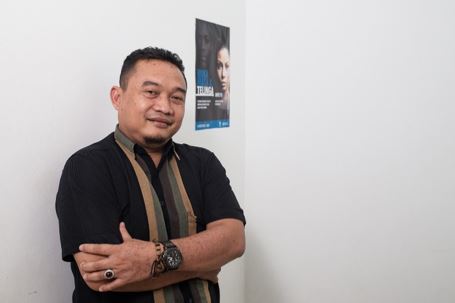My journey with TB: from patient to activist

Budi Hermawan, Chairman of Indonesian TB Patient Organization (POP TB). Photo credit: WHO Indonesia
“My name is Budi Hermawan, and I am a TB survivor and activist. My story started way back in 2003. I was coughing for some time, but I shrugged it off, thinking it was just an ordinary cough. One night, I was sweating profusely, and a few days later, I started to cough blood. I went to a clinic for treatment. My X-ray result showed that I was positive with TB, so the doctor prescribed some TB medicines. Three months later, I felt better. The doctor did not clearly say how long the TB medication was, so I did not bother to check again with the doctor. In hindsight, TB education was lacking at that time. I should have been advised to take medicines until the treatment is completed and consult the doctor.
Seven months after I thought I was ‘cured’, I suffered from horrifying coughs with more blood. I went straight to the hospital. This time, the doctor strongly advised me to take my drugs until I complete my treatment. I desperately wanted to recover quickly, so I tried other kinds of non-medical therapy for several years. My coughing only grew worse.
In 2011, I was introduced to a young doctor. Based on the sputum test, my TB was still positive, so he advised removing a part of my lung that was infected. The surgery cost was so expensive, so I needed some time to discuss it with my family. Two months later, I returned to the doctor, saying that I was ready for the surgery. To my surprise, he shared the great news that a new treatment was available in Indonesia, so surgery was out of the picture.
The doctor explained that I was most likely infected with Multi Drug-Resistant Tuberculosis (MDR-TB), a form of TB that does not respond to two of the most potent anti-TB drugs. There was only one MDR-TB service in Indonesia, at Persahabatan Hospital in Jakarta. The doctor informed me upfront that the treatment would be long and challenging. I lived in Bogor, so commuting to Jakarta every day seemed unbearable. But my biggest fear was infecting my own family. I asked the doctor, “What would you do if you were in my shoes?” Without any doubt, he assured me that TB is curable, and this brought me hope.
I finally sought treatment at Persahabatan Hospital. They did a sputum test and asked me to wait for three months to get the result. Back in 2011, there was no rapid molecular test. I was advised to wear a mask to avoid infecting others. Three months later, the test confirmed that I had MDR-TB and had to undergo intensive treatment. I moved out of my family home in Bogor and rented a room near the hospital. It was the most tiring two years of my life. I was physically and psychologically drained, and I lost a considerable portion of my savings in two years.
Getting infected with TB is my turning point in life. Getting cured of TB changed me at a very personal level. I promised to dedicate my life to support other patients who are not as privileged as I am. Many TB patients come from poor households. Due to stigma, some of them are at risk of losing their jobs. Through POP TB patient organization and STOP TB Indonesia, we advocate for TB patients with a severe condition in accessing the Family Hope cash transfer scheme under the Ministry of Social Affairs. We also assist TB patients who are discriminated in the workplace to ensure their rights as a patient and employee can be fulfilled.
COVID‑19 pandemic has not stopped us from intensifying our efforts to stop TB, with community engagement at the heart of our work. POP TB and other patient organizations are more active in involving communities to do home-visits and assist patients during their treatment. We launched a survey to find out the most pressing needs for patients. Based on that survey, we raised funds to provide mobile phones for patients and counsellors so that treatment can be monitored regularly. As a result, the TB treatment dropout rate in East Jakarta dropped from 23% in 2019 in to 8% in 2020. The clock is ticking. We need to find new and effective ways to stop TB. Let's work together to save the nation from TB.”
